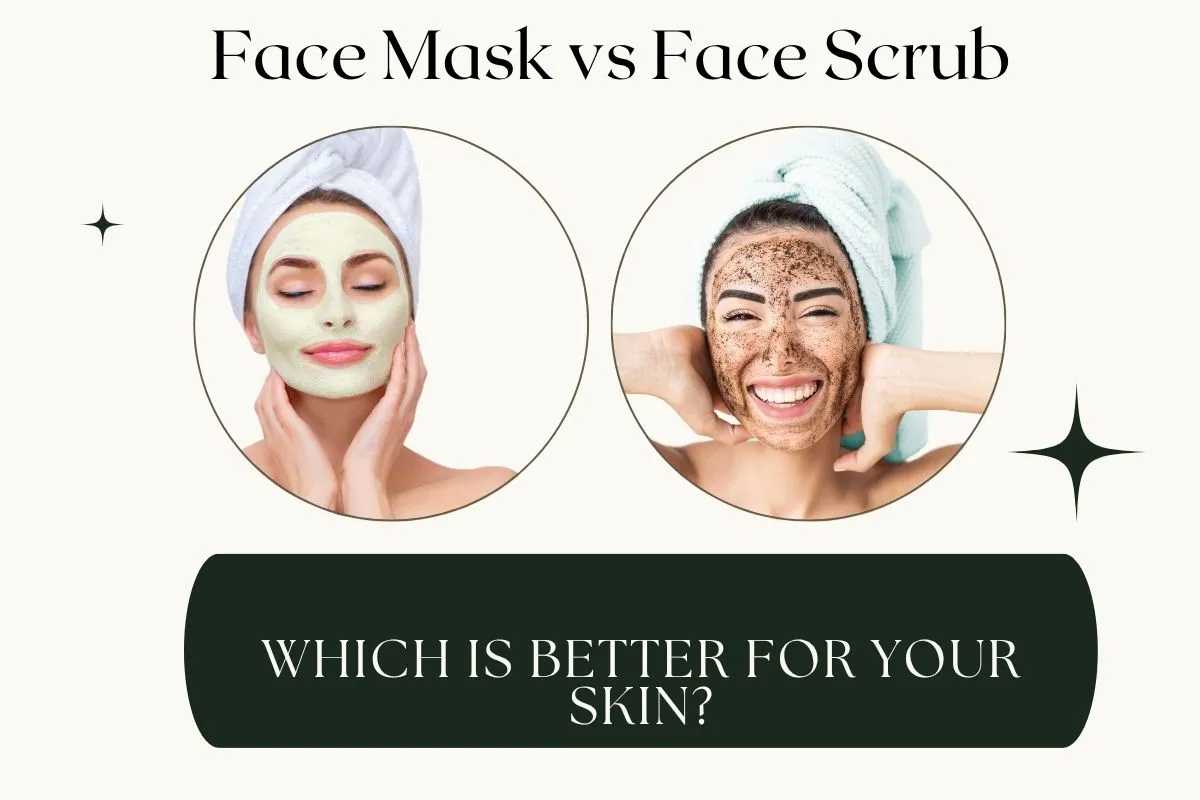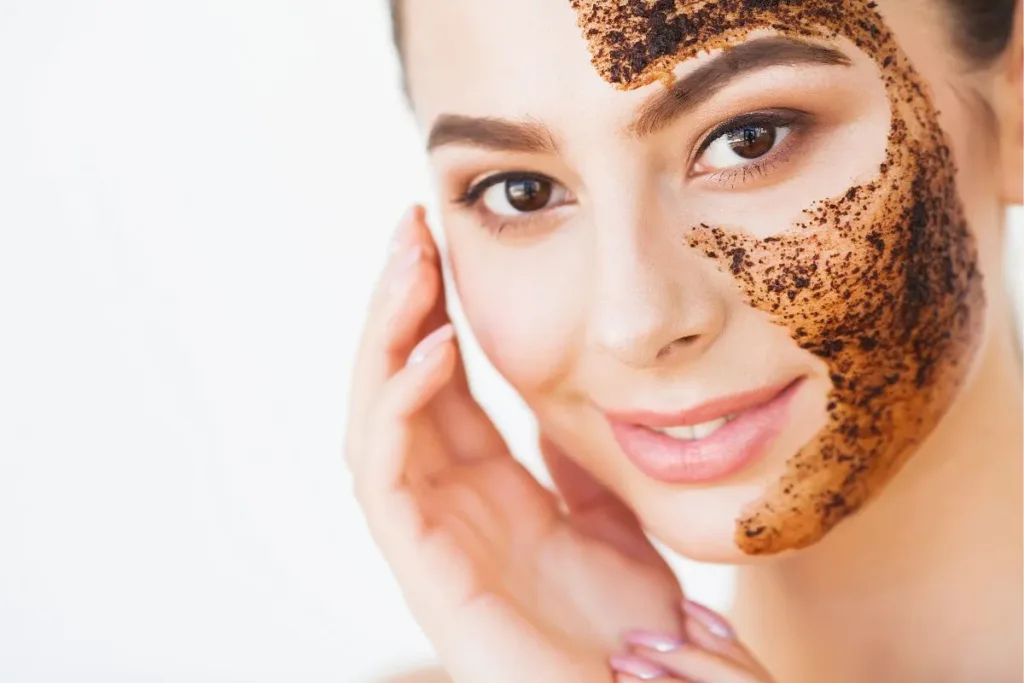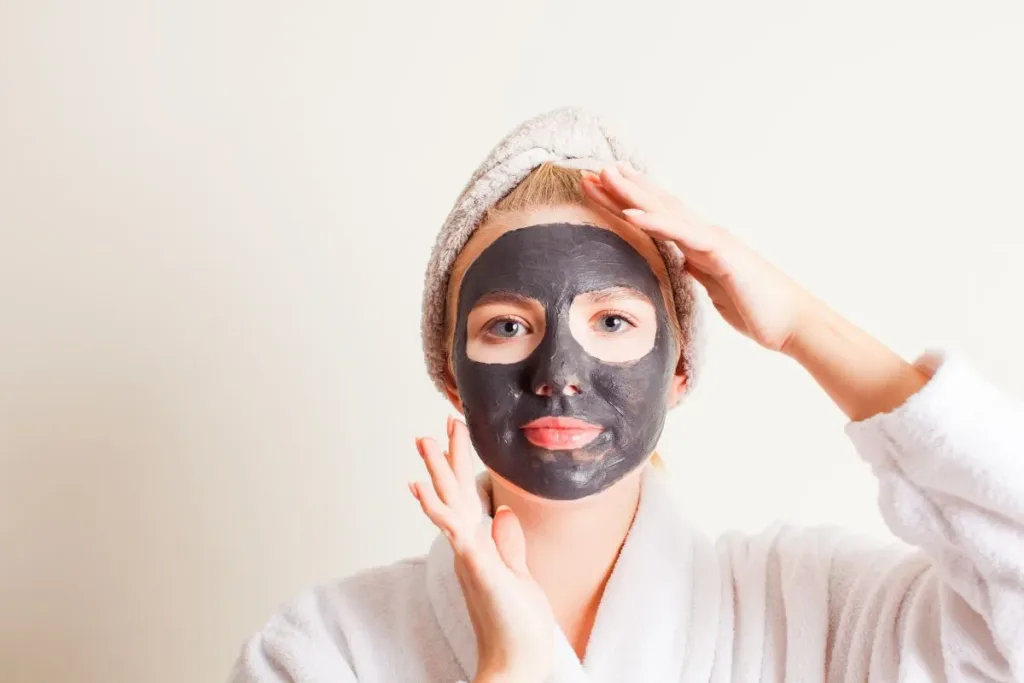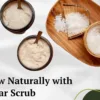No products in the cart.

When it comes to skincare, one question continues to puzzle beauty lovers everywhere: face mask vs face scrub – which truly works best for glowing skin? Both products promise smoother, brighter, and healthier skin, but their effects, ingredients, and results are not the same. A face scrub buffs away dullness with exfoliating particles, while a face mask nourishes your skin with deep hydration or detoxification. Understanding what your skin truly needs can make all the difference.
But here’s the twist: using the wrong one—or using both incorrectly—can do more harm than good. So how do you know when to reach for a scrub and when to pamper your face with a soothing mask? The answer lies in your skin’s condition, timing, and product choice. Read on to discover the expert-backed secrets to transforming your skincare routine. By the end, you’ll know exactly what your skin is craving—and how Hudira’s herbal solutions can help.
What Is a Face Scrub?

A face scrub is a skincare product specifically formulated to physically exfoliate the surface layer of your skin. It works by using tiny particles—commonly crushed walnut shells, apricot seeds, oatmeal, sugar, or jojoba beads—to manually slough off dead skin cells, dirt, and oil buildup from the top layer of your skin.
Over time, skin naturally sheds dead cells. However, this process can slow down due to aging, environmental factors, or dehydration, leading to a dull, rough, and uneven complexion. A face scrub helps accelerate this turnover, revealing fresher, brighter skin underneath. This simple step, when done correctly and gently, is a game-changer in achieving a glowing complexion.
Benefits of Using a Face Scrub
1. Removes Dead Skin Buildup
Every day, your skin sheds millions of dead skin cells. When not properly cleared, they can accumulate on the surface, making your face look flaky and tired. Face scrubs help dislodge these dead cells, resulting in a visibly smoother and more even skin texture. This process is essential for promoting the natural regeneration of healthy new cells.
2. Unclogs Pores & Prevents Breakouts
Dead cells, oil, and pollutants can clog your pores, creating a breeding ground for bacteria—leading to acne, blackheads, and whiteheads. By physically exfoliating these impurities, face scrubs purify pores and help keep your complexion clear and clean. Regular exfoliation is particularly beneficial for oily and acne-prone skin, where buildup tends to be more common.
3. Improves Blood Circulation
The gentle massaging motion used while applying a face scrub helps stimulate blood flow beneath the skin’s surface. This improves circulation, bringing oxygen and nutrients to skin cells, which supports skin healing, radiance, and a natural healthy glow. Over time, this can contribute to a firmer, more youthful appearance.
4. Boosts Absorption of Skincare Products
When dead skin cells accumulate, they act like a barrier, blocking the absorption of serums, moisturizers, and face masks. By clearing this layer, a scrub enhances your skin’s ability to absorb nutrients and hydration from the products you apply afterward. This makes your entire skincare routine more effective—your products work smarter, not harder.
5. Smoothes Skin Texture
Rough patches and uneven skin texture can be caused by poor cell turnover or sun damage. A face scrub gently buffs away surface irregularities, leaving your skin feeling silky soft and visibly smoother. With consistent use, it helps refine the skin’s appearance and tone.
6. Brightens Complexion
Exfoliating dull skin reveals the newer, radiant layer underneath. Many users notice an instant brightness and glow after using a scrub because light reflects more evenly off freshly exfoliated skin. This is particularly helpful for those with tired, lackluster, or sallow skin.
7. Reduces the Appearance of Fine Lines Over Time
By encouraging regular cell turnover and collagen stimulation (thanks to improved circulation), scrubs can gradually reduce the visibility of fine lines and surface wrinkles. While they’re not anti-aging treatments on their own, they amplify the effects of anti-aging serums and moisturizers that follow.
Important Caution: Not All Face Scrubs Are Equal – Here’s Why
While face scrubs can dramatically improve skin texture and clarity, choosing the wrong scrub or using it incorrectly can actually harm your skin. Many commercial products contain harsh abrasives and synthetic fillers that do more damage than good—especially when used too frequently or applied with too much pressure.
1. Microtears in the Skin
Many face scrubs on the market—especially those with large, irregular particles like crushed walnut shells—can create tiny, invisible cuts on the skin surface. These are called microtears.
Why it matters:
Microtears compromise the skin’s protective barrier, making it more vulnerable to:
- Bacterial infections
- Environmental damage (pollution, UV)
- Premature aging due to loss of skin integrity
What to avoid:
- Coarse scrubs with sharp, jagged particles
- Aggressive rubbing motions during application
2. Inflammation or Redness
Using a harsh scrub or scrubbing too often can irritate the skin, especially if it’s already sensitive or inflamed. This leads to:
- Redness
- Stinging
- Blotchiness
- Worsening of conditions like rosacea or eczema
Why it happens:
Excessive exfoliation stimulates the skin too much, causing inflammatory responses. The skin tries to protect itself by increasing blood flow to the area, resulting in redness and discomfort.
3. Stripping of Natural Oils
Your skin naturally produces oils (sebum) to maintain moisture and act as a barrier. When you scrub too hard or too often, you strip away these essential oils, leaving your skin:
- Dry
- Tight
- Flaky
- More prone to compensatory oiliness (which can trigger breakouts)
Balance is key. A gentle exfoliator respects your skin’s barrier and works with it—not against it.
4. Long-Term Sensitivity or Breakouts
You may not notice the damage immediately, but consistent over-exfoliation can weaken the skin barrier over time, leading to:
- Chronic sensitivity
- Easily triggered irritation
- Reactive breakouts
- Reduced tolerance to active ingredients like vitamin C or retinoids
Ironically, using the wrong scrub in hopes of achieving clear skin can end up causing more breakouts and dullness in the long run.
What Is a Face Mask?

A face mask is a concentrated skincare treatment designed to target specific skin concerns by delivering active ingredients directly to your skin in a short, controlled session (usually 10–20 minutes). Unlike daily cleansers or toners, masks sit on the skin longer, allowing deeper penetration of nutrients, minerals, and herbal actives.
Face masks come in various forms, each suited to different skin types and goals:
- Clay Masks: Absorb excess oil and detoxify
- Gel Masks: Hydrate and soothe
- Sheet Masks: Infuse skin with serum-rich ingredients
- Peel-off Masks: Exfoliate and remove impurities
- Cream Masks: Nourish and moisturize
At Hudira, our focus is on herbal, chemical-free, and halal-certified masks that are safe even for sensitive or postpartum skin. We use time-honored Ayurvedic ingredients like turmeric, neem, rose, orange peel, saffron, and more to offer real results without harsh side effects.
Benefits of Using a Face Mask
Let’s dive into each benefit individually:
1. Provides Intensive Hydration or Oil Control
Depending on the type of mask, it can either replenish moisture in dry, dehydrated skin or absorb excess oil in oily, acne-prone skin.
- Hydrating Masks contain humectants like honey or rose extract that draw water into the skin, plumping up fine lines and restoring suppleness.
- Oil-Control Masks (like clay or neem-based ones) regulate sebum production and reduce greasiness.
Hudira Example: Our rose-based brightening mask deeply hydrates without clogging pores, while the neem-infused Anti-Acne Mask helps reduce oiliness naturally.
2. Detoxifies and Purifies the Skin
Throughout the day, your skin accumulates pollutants, sweat, excess oil, and product residue. A good face mask acts like a vacuum—drawing out toxins and impurities from deep within the pores.
- Clay-based masks, especially those with multani mitti (Fuller’s Earth) or kaolin, absorb dirt and heavy metals.
- Herbal purifiers like turmeric and neem help disinfect the skin and prevent bacterial buildup.
Why this matters: Detoxifying masks prevent breakouts, reduce congestion, and give your skin a fresh start.
3. Calms Inflammation and Redness
Irritated skin often needs soothing and anti-inflammatory support. Masks infused with calming botanicals can:
- Reduce redness
- Soothe sunburn or irritation
- Help with rosacea, sensitivity, or post-acne flare-ups
Ingredients like aloe vera, rose, saffron, and turmeric are especially known for their skin-calming properties.
Hudira Example: Our turmeric and saffron mask gently reduces redness while supporting healing—ideal after a stressful day, hormonal flare, or exposure to pollutants.
4. Delivers Antioxidants and Nutrients
Unlike everyday products, masks deliver a high concentration of active ingredients in one go. This makes them the perfect medium for introducing your skin to antioxidants and vitamins that:
- Fight free radical damage (caused by pollution and UV)
- Support collagen production
- Repair and renew skin cells
Examples of such powerful nutrients include:
- Vitamin C (from orange peel and amla) – brightens and firms
- Vitamin E (from oils and plant extracts) – nourishes and softens
- Curcumin (from turmeric) – antioxidant, anti-inflammatory, antibacterial
5. Brightens, Firms, and Rejuvenates the Skin
One of the most loved effects of using a face mask is the “post-mask glow.” A well-formulated herbal mask:
- Brightens dull skin by improving blood flow and cell turnover
- Firms the skin by tightening pores and hydrating deeper layers
- Rejuvenates your look, making you appear more awake and youthful
This is especially beneficial for skin that feels tired, pigmented, or aged. The cooling effect, combined with rich antioxidants, boosts circulation and stimulates renewal.
6. Supports Skin Recovery and Barrier Health
Face masks can play a healing role in:
- Post-acne recovery
- Postpartum skin repair
- Dry, cracked, or stressed skin
Herbal masks strengthen the skin’s protective layer, enhancing its ability to lock in moisture and defend against environmental stressors. This makes them an ideal choice for mothers, stressed individuals, or those transitioning skincare routines.
7. Offers Relaxation and Mental Calm
Skincare is self-care. The act of applying a face mask, lying back, and letting your skin soak in healing herbs is not just good for your face—it’s good for your mental well-being.
Many of our customers report:
- Reduced anxiety and tension while masking
- A sense of peace from the natural scent of rose, saffron, or sandalwood
- Confidence from watching their skin glow over time
Hudira’s clean, calming formulations turn every mask session into a mini spa ritual at home.
Face Mask vs Face Scrub: Key Differences
| Feature | Face Scrub | Face Mask |
| Function | Exfoliates by removing dead skin | Treats and hydrates skin |
| Texture | Gritty or grainy | Creamy, gel-like, or sheet-based |
| Primary Benefit | Smoothness and clarity | Hydration, detox, and treatment |
| When to Use | Before a mask, 2–3 times/week | After cleansing or scrubbing, 1–3 times/week |
| Best For | Clogged pores, rough texture | Dullness, dryness, irritation |
Which One Is Right for You?
Your skin type and skincare goals should determine whether you lean more toward a face scrub or a face mask—or if you should be using both in rotation.
For Oily or Acne-Prone Skin:
- Best Scrub: Gentle herbal exfoliator with neem or tea tree
- Best Mask: Clay-based mask like Hudira’s Anti-Acne Face Mask with neem leaf
For Dry or Sensitive Skin:
- Best Scrub: Avoid harsh scrubs; use oatmeal or jojoba bead-based exfoliants
- Best Mask: Hydrating mask with aloe vera, rose, or honey
For Dull or Uneven Skin:
- Best Scrub: Exfoliating scrub with mild fruit enzymes or botanical beads
- Best Mask: Brightening face mask with saffron, turmeric, or orange peel
Can You Use Both a Face Scrub and Face Mask?
Yes! Using both a face scrub and a face mask in the same routine can maximize results—if done correctly. Each product serves a different but complementary function, and when used in the proper sequence, they create a powerful skincare synergy that transforms dull, congested skin into clear, radiant, and well-nourished skin.
Let’s break it down step-by-step for clarity:
Step 1: Start with a Face Scrub
Before applying any treatment product like a mask, your skin must be cleansed and exfoliated. This is where the face scrub comes in.
Scrubs:
- Remove dead skin cells that block the surface of your skin
- Unclog pores, removing dirt, excess oil, and impurities
- Smooth out rough texture, creating a better canvas for the next step
- Stimulate blood flow to the skin’s surface
By exfoliating first, you are allowing the mask’s active ingredients to penetrate deeper and perform more effectively—whether it’s hydrating, brightening, purifying, or soothing.
Important Tip: Use gentle, circular motions without applying pressure. Let the scrub do the work—don’t “rub” it in forcefully.
Step 2: Follow with a Face Mask
Once your pores are clean and open from scrubbing, it’s the perfect time to apply a face mask. Depending on your skin’s need, choose a:
- Clay or neem-based mask to detox and control oil
- Rose or saffron-based mask to hydrate and brighten
- Turmeric or sandalwood-based mask to calm inflammation
The mask:
- Delivers deep hydration or nutrients into the newly revealed skin layer
- Treats specific concerns like acne, dullness, or sensitivity
- Refines pores, balances skin tone, and improves glow
Step 3: Don’t Overdo It – Stick to 2–3 Times a Week
While using both together is highly effective, it should not be done daily. Over-exfoliation and frequent masking can:
- Disrupt your skin barrier
- Cause dryness, peeling, or sensitivity
- Lead to rebound oiliness or breakouts
Best practice:
- For normal to oily skin: 2–3 times per week
- For sensitive or dry skin: once a week is enough
Let your skin rest between sessions so it can regenerate and respond better over time.
Step 4: Always Moisturize Afterward
This is a crucial step that many people skip.
After exfoliating and masking, your skin is:
- More exposed (clean but vulnerable)
- In need of nourishment and protection
Use a light, hydrating moisturizer to:
- Lock in the benefits of the scrub and mask
- Rebuild your skin’s natural barrier
- Keep skin supple, soft, and balanced
For even better results, consider using a hydrating serum before moisturizing to seal in the mask’s active ingredients.
Herbal vs Chemical: Why Choose Natural Products?
Many commercial face scrubs and masks are loaded with sulfates, synthetic fragrances, and parabens. Over time, these can irritate sensitive skin and disrupt your natural barrier.
Hudira is committed to chemical-free, herbal, and halal skincare. Our face masks and scrubs are made with:
- Plant-based actives like neem, turmeric, saffron, rose, and orange peel
- No artificial fragrances or colors
- No alcohol, parabens, or sulfates
- Safe for all skin types, especially sensitive and postpartum skin.
How to Build the Perfect Skincare Routine
Want to glow without guesswork? Here’s how to build a simple yet effective regimen using both face masks and face scrubs:
Morning Routine:
- Cleanse
- Moisturize
- Sunscreen
Evening Routine (2–3x/week):
- Cleanse
- Exfoliate with face scrub
- Apply face mask
- Tone (if needed)
- Moisturize
Consistency is key. Think of your skincare routine as self-care with benefits.
Quick Tips to Remember
- Always patch test new products, even herbal ones.
- Use scrub and mask on clean, damp skin.
- Don’t scrub daily—it can lead to over-exfoliation.
- Don’t apply a mask too close to your eyes or lips.
- Follow up with a hydrating moisturizer post-treatment.
Final Verdict: Face Mask vs Face Scrub
There’s no one-size-fits-all answer. Both face masks and face scrubs serve different purposes—and when used wisely, they can complement each other beautifully. Whether your goal is to detox, brighten, hydrate, or smooth, the key is choosing the right product at the right time.
If you’re looking for effective, natural solutions tailored to your skin’s rhythm, Hudira’s herbal skincare range has exactly what you need.
Call-to-Action
Let your skin breathe, glow, and heal—naturally. Explore Hudira’s carefully curated, halal-certified collection of face masks and herbal treatments. Our promise? Clean ingredients. Visible results.
FAQs
Q. Can I use both a face scrub and a face mask?
Yes! Scrub first, then apply a face mask to get maximum benefit from both.
Q. Which is better for acne: face mask or face scrub?
Both help, but a gentle scrub followed by an anti-acne mask (like Hudira’s) works best.
Q. How often should I use a scrub or mask?
2–3 times per week is ideal. Daily use may irritate the skin.
Q. Should I scrub before or after using a mask?
Before—exfoliating first preps the skin to absorb mask nutrients better.
Q. Are Hudira products safe for sensitive or halal-conscious users?
Absolutely. Hudira’s products are herbal, chemical-free, and halal-certified, perfect for all skin types.



Add comment